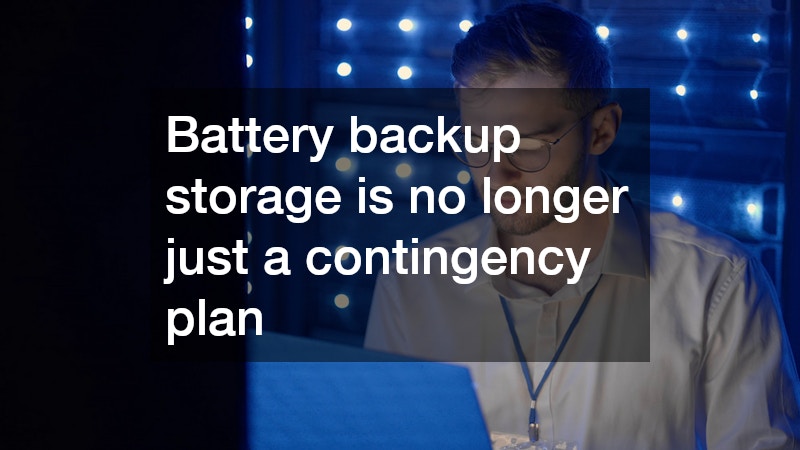
In today’s digital age, data centers form the backbone of countless industries, powering everything from cloud computing to streaming services and financial transactions. The demand for uninterrupted service and robust data security has never been higher. One critical component ensuring this continuity is battery backup storage. As data centers evolve to meet increasing reliability standards, battery backup storage solutions are becoming more advanced, efficient, and indispensable. This blog explores how these systems are transforming data center operations and safeguarding the digital world.
The Growing Importance of Data Center Reliability
Data centers must operate around the clock without failure. Even a few seconds of downtime can lead to significant financial losses, data corruption, or damaged reputation. As businesses increasingly rely on real-time data access and cloud services, the tolerance for power interruptions has dropped drastically.
To mitigate these risks, data centers implement multiple layers of power redundancy, with battery backup storage playing a crucial role. Unlike traditional generators that require time to start, battery systems provide instantaneous power during outages, bridging the gap until secondary power sources activate. This immediate response capability is essential for maintaining uptime and protecting sensitive hardware.
Advancements in Battery Backup Storage Technologies
Battery backup storage has come a long way from early lead-acid solutions to modern lithium-ion technologies, which offer superior energy density, longer life cycles, and faster recharge times. These advancements enable data centers to deploy compact, efficient systems that can support critical loads with greater reliability. Additionally, lithium-ion batteries are lighter and take up less space, allowing data centers to maximize their facility footprints. This technological progress also improves safety by reducing risks associated with overheating and chemical leakage, making these systems more suitable for densely packed and sensitive environments such as data centers.
Modern battery backup storage systems incorporate intelligent management software that monitors battery health, predicts failures, and optimizes charge cycles. This smart technology reduces maintenance needs and extends battery lifespan, translating to lower operational costs and fewer unexpected outages. Beyond just maintenance, these systems can dynamically adjust power delivery based on real-time demand, improving energy efficiency. Advanced diagnostics help operators understand battery performance trends, enabling strategic decisions about replacements and upgrades well before failures occur, which supports continuous uptime and helps prevent costly disruptions to critical services.
Integration With Smart Monitoring and Management Systems
One of the most transformative aspects of battery backup storage in data centers is its integration with smart monitoring and management platforms. These systems collect real-time data on power usage, battery performance, and environmental conditions.
With this data, facility managers can proactively address issues before they lead to failures. For example, if a battery cell shows signs of degradation, the system can alert maintenance teams to replace or service it before an outage occurs. This predictive maintenance capability significantly improves overall reliability and efficiency.
Furthermore, data analytics derived from monitoring systems help optimize energy consumption patterns, ensuring that backup resources are used effectively and sustainably.
Supporting Sustainability Goals
Data centers consume vast amounts of energy, and many operators are committed to reducing their environmental impact. Battery backup storage, particularly when paired with renewable energy sources, plays a vital role in these sustainability efforts. It helps transition data centers toward cleaner, more resilient power grids by storing surplus energy when demand is low and releasing it during peak periods.
By storing excess energy generated from solar or wind power, battery systems enable data centers to rely less on fossil fuels and reduce carbon footprints. This integration supports grid stability and allows for better management of intermittent renewable energy sources. Additionally, modern batteries with longer lifespans decrease waste and resource consumption, contributing to greener operations. The use of recyclable materials in battery construction and improvements in end-of-life battery recycling further enhance their environmental benefits, aligning with corporate social responsibility goals.
Enhancing Scalability and Flexibility
As data demand grows, so does the need for scalable infrastructure. Battery backup storage solutions offer modular designs that can be expanded or reconfigured to meet evolving power requirements.
This flexibility allows data centers to add capacity without extensive downtime or costly overhauls. It also supports hybrid energy models where batteries work alongside generators and renewable sources, providing a comprehensive power strategy.
Real-World Impact: Case Studies and Industry Adoption
Many leading data center operators have embraced advanced battery backup storage systems to enhance reliability. For instance, major cloud providers utilize lithium-ion battery arrays to ensure seamless power continuity across their global networks.
These implementations have resulted in measurable reductions in downtime, improved maintenance efficiency, and stronger compliance with industry standards. The adoption trend underscores the critical role battery backup storage plays in modern data center infrastructure.
Battery backup storage is no longer just a contingency plan—it has become a cornerstone of data center reliability and efficiency. Through technological advancements, smart integration, and environmental benefits, these systems are revolutionizing how data centers operate in an increasingly connected world.
As data demands continue to rise, investing in cutting-edge battery backup storage solutions will be essential for businesses aiming to maintain uptime, protect digital assets, and support sustainable growth. The future of data centers is powered by intelligent, resilient energy storage—and battery backup storage is leading the way.



